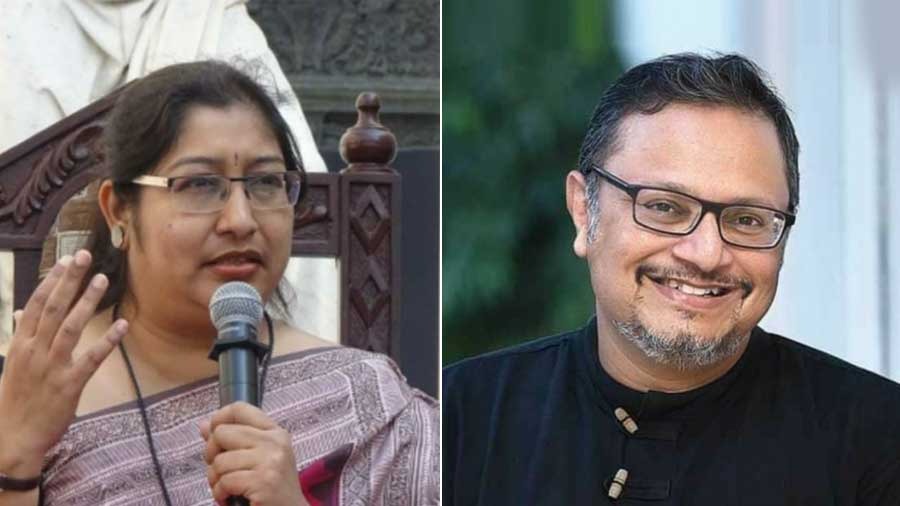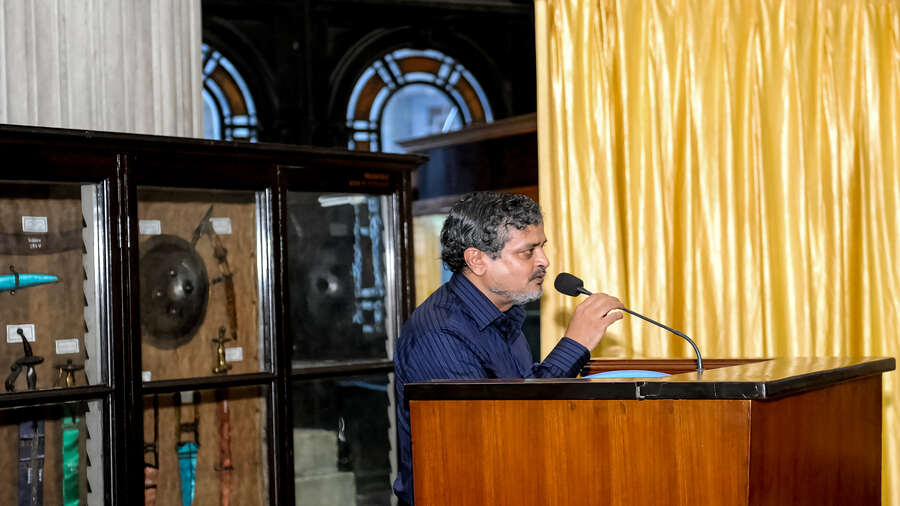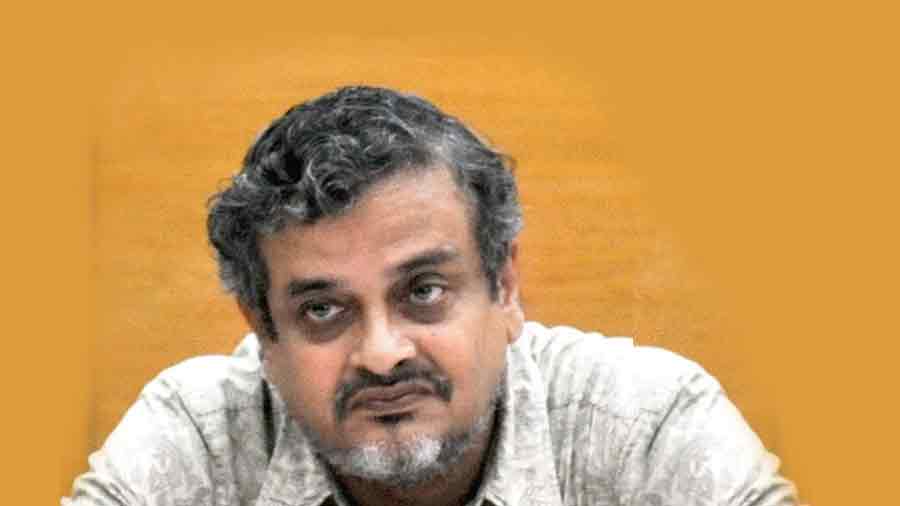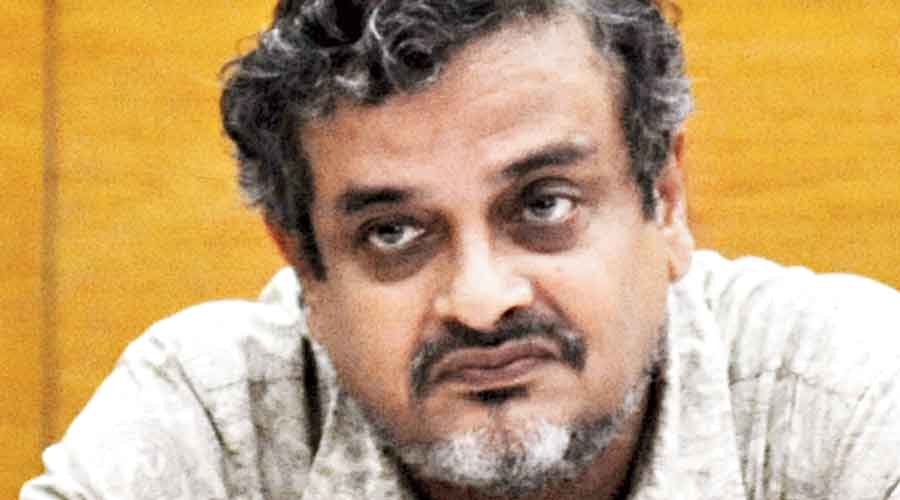Debnita (Deb): It has taken a while for the news of Swapanda’s passing away to sink in for us, hasn’t it?
Debanjan (DC): Yes and no. In some ways it will never sink in for me. I associate him with light and lightness. There was always something very luminous about his presence. There was his legendary scholarship, his unending curiosity about every object or idea around him. We were of course incredibly fortunate at JUDE in the ’90s to be taught by luminaries in the field of English literature. But what marked Swapanda off from the rest was the lightness of his being. He never took himself seriously. He could make light of anyone or anything: nothing was too sacred or, indeed, too profane, for being held up for comic censure. And I think humour, and his essential joie de vivre, made many of us aware of different models of scholarship, and other pathways to knowledge.

Debnita Chakravarti and Debanjan Chakrabarti

What marked Swapanda off from the rest was the lightness of his being. He never took himself seriously. He could make light of anyone or anything: nothing was too sacred or, indeed, too profane, for being held up for comic censure. His humour, and his essential joie de vivre, made many of us aware of different models of scholarship
Deb: Swapanda was the teacher who probably influenced you the most in our time in JU. You even started sporting a beard that imitated his from your 3rd year. Do you remember your first meeting with him?
DC: Actually I don't recall the first time I saw him. I had heard a lot about him from my college days (+2) in Narendrapur though. You have a vivid memory of seeing him first, don’t you?
Deb: Yes, my first encounter with him was during the Freshers’ Week programme. And it was an ‘encounter’. Some of us were rehearsing for Freshers’ Week in the space behind the legendary Lobby. It seemed like a relatively quiet space. As we got into the thick of our song-and-dance routine, a door we thought was permanently locked up swung open, and a remarkably handsome man ticked us off in the kind of impeccable English we had not heard outside of films, for disturbing him and his tutorial students. We must have looked like freshers and our choice of rehearsal venue an innocent mistake, for his tone changed midway through his admonishment and he ended up suggesting another space and wishing us well.
And that one incident was for us a memorable welcome to the world of JUDE (Jadavpur University Department of English), where the affection and concern of all our teachers were never in doubt. What incident do you remember most about SKC at JUDE?
'Be tactical and mercenary in your approach to examinations'
DC: JUDE could be a formidable space for those of us who did not come from urban, metropolitan backgrounds. Swapanda made it a point to reach out to those of us coming from small towns and mofussils and this made JU less daunting for us. However, what I shall never forget was how he inspired me to continue at JUDE for my PG degree. It was immediately after our BA results were published and I was crestfallen at having missed a First by a whisker. I was determined to move away from “Eng Lit Crit” -- I think this was Swapanda’s term -- and had secured admission to the Indian Institute of Mass Communication. Many teachers reached out to console and counsel me, but I wasn’t having any of it.
However, it was a chat with SKC -- I remember this was at Milanda’s canteen, and he offered me a cigarette, the first time a teacher had offered me one. It was his way of breaking the social hierarchy between a teacher and a student. He shared his own story of underwhelming undergraduate results, and his realisation that examinations did not assess one’s scholarship. The exact words of his advice still ring in my ears: “Be tactical and mercenary in your approach to examinations,” he said. He knew I was interested in the media, and promised me that should I pursue MA at JU, he would give me necessary leads in journalism after the postgraduate exams.
And he kept his word. He sent me off to The Telegraph, the day after I had appeared for the dreaded viva voce exam, with a note addressed to Rudrangshu Mukherjee, who was then the editor of the editorial pages of the newspaper.
Deb: Speaking of the dreaded viva voce, I recall Swapanda’s kindness and judicious intervention when I had responded correctly to a question from an external examiner – the answer was Edvard Munch. I had no idea how ‘Munch’ was pronounced back then and made a complete hash of it. Swapanda gallantly leapt to my rescue in the most unobtrusive manner possible. “Can you spell Munch?” And of course I did!
DC: Yes, exactly.... I was hoping for a leisurely break after the prolonged agony of the MA exams, but SKC would have none of it. As instructed by Swapanda, I handed over the letter of introduction for Rudrangshuda to Bhaswatidi (Chakravorty, senior journalist and wife of Swapanda). At The Telegraph office, I was made to take another exam that very instant. And asked to join the next day.
Deb: Thus Bhaswatidi entered our lives! She was hugely influential in the next stage of our studies, eventually helping us choose University of Reading. We had the most amazing adda at their Convent Road flat soon after we got married. Swapanda was the gracious host and lovingly served us a selection of home-cooked dishes. I remember discussing our plans to go to the UK for our PhDs and it was then that she suggested we also consider her alma mater.
Speaking of which, do you remember that we had Swapanda and Bhaswatidi over for adda and dinner at your parents’ apartment in Ballygunge just before we were supposed to head off to the UK for our research degrees?
He was a real Sidhu Jyatha with his mental filing system of information
DC: Oh yes! That was the very evening that one of the most notorious crimes of passion in Kolkata in recent times -- the Leena Sen murder case, which happened in a flat on the top floor of the same building -- hit the headlines. Our guests for the evening, which included Swapanda and Bhaswatidi, had to make their way through a crush of media and police outside.
Swapanda was in his element that evening. He claimed, much to the incredulity of everyone at the adda, that the victim was a former beauty pageant winner from the 1970s. And this was pre-Google era. Imagine our surprise when later investigation revealed that Swapanda was right! He was a real Sidhu Jyatha with his mental filing system of information.
And at Reading, imagine how proud we were of JUDE when one of the Renaissance specialists and Thomas Middleton scholars at the School of English and American Literature asked us if we knew Prof Swapan Chakravorty!
Deb: You had the opportunity to work with him in his other, less academic, roles, e.g. when he was leading Victoria Memorial Hall and the National Library.
DC: Yes, that was a somewhat unique perspective I had. I remember visiting him when he was the director-general of the National Library, with Dr Richard Smith of Warwick University. We were trying to set up an online repository of all research in India on English language teaching, or ELT. Swapanda had just started on a similar but much more ambitious project with National Digital Library of India (NDLI) in association with Prof Partha Pratim Chakrabarti of IIT Kharagpur. I remember that after I had introduced him to Dr Smith, Swapanda introduced me back to Richard as his student. He was really proud of his students, and I was always his student first.

Swapan Chakravorty when he was curator of the Victoria Memorial Hall in Kolkata Amit Datta/My Kolkata
Deb: Then there was the time soon after we had got engaged and we met Swapanda at the wedding of our friend Mrinmayee. He hadn’t heard that we were engaged. With his characteristic lopsided grin he introduced us to another guest at the wedding: “Meet Debnita. She was my student. Now, she is Debanjan’s fiancee.”
DC: He was very fond of our daughter Lori, wasn’t he?
Deb: Yes, he was! My last interaction with him was when we had invited him to a seminar at our college. As I saw him off, not only did he enquire about her but I spent about five minutes responding to all the questions he had about her. He remembered her childhood misadventures vividly.
DC: I have very fond memories of Swapanda while travelling with him on work to London, Delhi etc. He was a big draw at the Battle of Ideas Festival one year. At a meeting on higher education research in Delhi just a few years back, he captivated the dinner audience of vice-chancellors and deans from all over India.
I spoke to Sujatadi (Sen), my predecessor at the British Council and also Swapanda’s classmate and dear friend, the day after his passing. We discussed that one way of remembering him would be to publish the phenomenal research he did for Kolkata’s literary heritage as part of a bid to secure the title of UNESCO City of Literature for the city.
Deb: With his passing a light has indeed gone out, in our lives as in the lives of his countless students, teachers, peers, friends. I find it very hard to believe that seeing off Swapanda as he got into the car after the special lecture at my college will be my last meeting with him.
About the authors:
Debnita Chakravarti is Associate Professor of English at Shri Shikshayatan College, Kolkata
Debanjan Chakrabarti is Director, British Council, East and Northeast India
Were you a student of SKC? Share your memories with ttmykolkata@gmail.com

